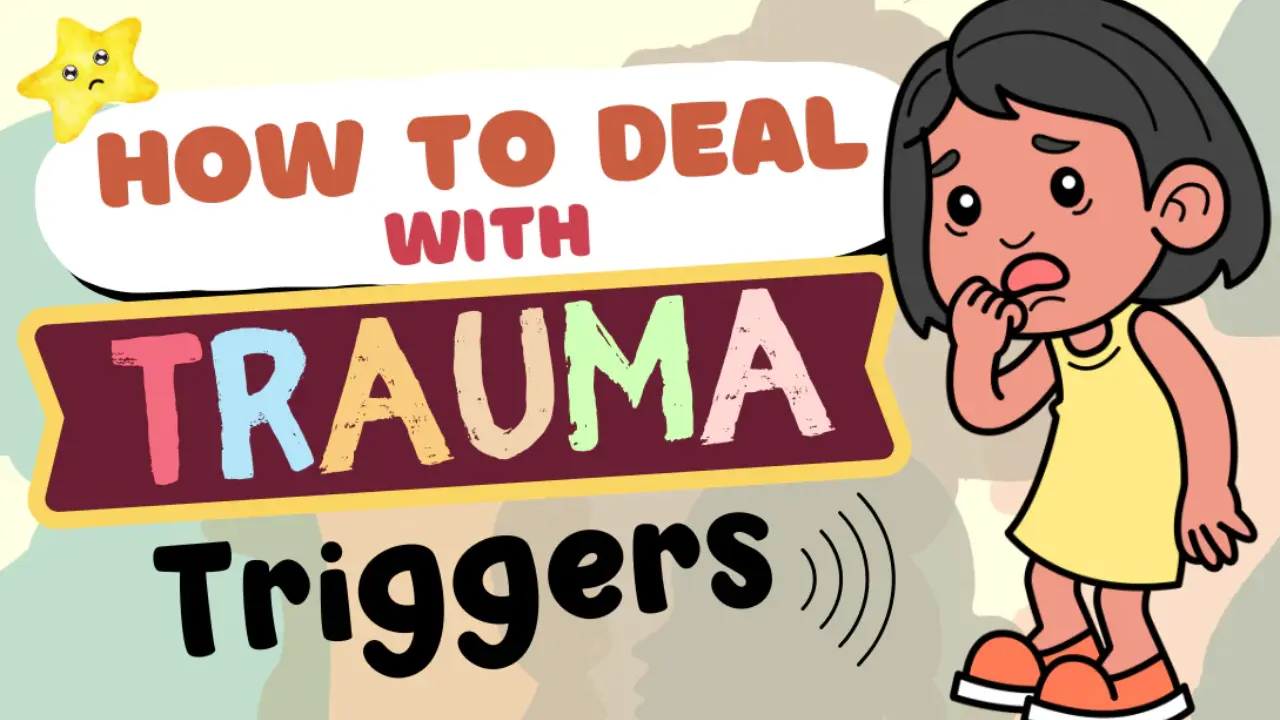Trauma triggers include any sounds, smells, or objects that cause you to recall a traumatic event from the past. They can make you mentally relive the trauma and experience the same feelings and bodily sensations as you did at the time of the incident. Your daily functioning and well-being may be negatively affected by trauma triggers, which can be extremely upsetting. In this article, we will explain Trauma Triggers: Effects and How to Overcome Them with some helpful strategies.
What are trauma triggers?
Anything that brings up memories of trauma or a particular aspect of trauma is a trauma trigger. Your memories and thoughts about the trauma suddenly resurface when you are exposed to a trigger. Because you are unable to stop the intrusive thoughts, your emotions change, and you start to respond.
You could experience helplessness, fear, unease, and emotional overload as a result of a trigger. As though you were experiencing the tragedy, you could experience the same emotions that you did at the time. Triggers are viewed as threats by the mind, which results in an emotional response like dread, panic, or agitation.
Consider the response to stimuli as a protective mechanism: Your defenses go up against the perceived threat as a result of being immediately transported back to the traumatic incident when you remember it.
Some common examples of trauma triggers are:
- Loud noises or sudden movements
- Crowded places or enclosed spaces
- Certain smells or tastes
- Specific words or phrases
- Certain dates or anniversaries
- News reports or media images
- People who resemble the perpetrator or the victim
- Objects or places that are associated with the trauma
Trauma triggers are unique to each individual and depend on their personal history and experience. What triggers one person may not trigger another.
How do trauma triggers affect you?
Trauma triggers can have a significant impact on your mental and physical health. They can cause you to experience symptoms of post-traumatic stress disorder (PTSD), which is a mental health condition that develops after exposure to a traumatic event.
Some of the symptoms of PTSD that can be triggered by trauma are:
- Emotional distress: Feeling severe emotional distress or physical reactions to something that reminds you of the traumatic event
- Avoidance: Trying to avoid thinking or talking about the traumatic event or avoiding places, activities, or people that remind you of it
- Negative thoughts: Having negative thoughts about yourself, other people, or the world or feeling hopeless about the future
- Memory problems: Having difficulty remembering important aspects of the traumatic event
- Relationship problems: Having difficulty maintaining close relationships or feeling detached from family and friends
- Loss of interest: Losing interest in activities you once enjoyed or having difficulty experiencing positive emotions
- Emotional numbness: Feeling emotionally numb or disconnected from your feelings
- Hypervigilance: Being easily startled or frightened or always being on guard for danger
- Self-destructive behavior: Engaging in risky or harmful behavior, such as drinking too much or driving too fast
- Sleep problems: Having trouble sleeping or staying asleep
Trauma triggers can also affect your physical health by causing stress-related symptoms, such as:
- Headaches
- Muscle tension
- Chest pain
- Heart palpitations
- Stomach problems
- Fatigue
- Immune system problems
Trauma triggers can make it hard for you to cope with everyday life and enjoy your activities. They can also affect your self-esteem, your relationships, your work performance, and your overall quality of life.
How can you overcome trauma triggers?
Trauma triggers can be challenging to deal with, but they are not impossible to overcome. Some strategies can help you cope with them and reduce their impact on your life.
Some of these strategies are:
Identify your triggers
Understanding your trauma triggers and how they affect you is the first step in overcoming them. You may achieve this by recording your triggers and your responses to them in a notebook or log. This might assist you in identifying the patterns and triggers that cause you the greatest difficulty.
To gauge the strength of your feelings and bodily sensations before, during, and after coming into contact with a trigger, you may also use a rating scale. This might assist you in monitoring your development and observing how your responses alter over time.
Ground yourself in the present
When you come across a trigger, you may have the sensation of traveling back in time and reliving the trauma. You must remain in the present and constantly tell yourself that you are safe and that the trauma has passed to combat this.
You can do this by using your senses to focus on what is happening around you right now. For example, you can:
- Look around and name five things you can see
- Listen and name five things you can hear
- Touch and name five things you can feel
- Smell and name five things you can smell
- Taste and name five things you can taste
You can also use positive affirmations to reassure yourself that you are okay and that you can handle this. For example, you can say to yourself:
- I am safe and secure
- This is just a memory and it cannot hurt me
- I am strong and resilient
- This is something I have already overcome, so I know I can do it again.
- I am not alone, and I have help.
Breathe deeply
Trauma triggers can cause you to breathe faster and shallower, which can increase your anxiety and stress. To calm yourself down, you need to breathe deeply and slowly, which can lower your heart rate and blood pressure and relax your muscles.
You can do this by using a simple breathing technique called the 4-7-8 method. To do this, you:
- Inhale through your nose for four seconds
- Hold your breath for seven seconds
- Exhale through your mouth for eight seconds
- Repeat this cycle four times or until you feel calmer
You can also use other breathing exercises, such as abdominal breathing, alternate nostril breathing, or box breathing, to regulate your breathing and soothe your nervous system.
Seek professional help
If trauma triggers are interfering with your life and causing you significant distress, you may benefit from seeking professional help from a therapist or counselor who specializes in trauma. A professional can help you process the trauma, heal from its effects, and develop coping skills to manage your triggers.
Different types of therapy can help with trauma triggers, such as:
- Cognitive-behavioral therapy (CBT): This is a type of therapy that helps you identify and challenge negative thoughts and beliefs that are related to the trauma and replace them with more realistic and positive ones. CBT also helps you face your fears and gradually expose yourself to your triggers in a safe and controlled way.
- Eye movement desensitization and reprocessing (EMDR): This is a type of therapy that uses eye movements or other forms of stimulation to help you process traumatic memories and reduce their emotional impact. EMDR also helps you replace negative beliefs about yourself with positive ones.
- Prolonged exposure therapy (PE): This is a type of therapy that helps you confront your traumatic memories and triggers repeatedly until they lose their power over you. PE also helps you reduce your avoidance behavior and increase your confidence in coping with stressful situations.
- Trauma-focused cognitive-behavioral therapy (TF-CBT): This is a type of therapy that combines CBT with trauma-specific techniques, such as relaxation training, coping skills training, trauma narrative, cognitive processing, and in vivo exposure. TF-CBT is specially designed for children and adolescents who have experienced trauma.
These therapies are evidence-based and have been proven to be effective in treating PTSD and reducing trauma triggers. However, they may not be suitable for everyone, so it is important to consult with a professional before starting any therapy.
Seek support from others
Trauma triggers can make you feel isolated and alone, but you don’t have to go through this by yourself. You can seek support from others who understand what you are going through and who can offer you comfort, empathy, and encouragement.
You can seek support from:
- Family members or friends who are supportive and trustworthy
- Support groups or online forums where you can share your experiences with other survivors of trauma
- Helplines or crisis centers where you can talk to someone who is trained to help people in distress
- Organizations or resources that provide information, education, or advocacy for people who have experienced trauma.
Seeking support from others can help you feel less alone, more understood, and more hopeful. It can also help you cope with your triggers better by providing you with practical advice, emotional support, or distraction.
Conclusion
In conclusion, trauma triggers are a natural and common response to a traumatic event. They can make you feel like you are reliving the trauma and experiencing intense emotions and physical sensations. Trauma triggers can affect your mental and physical health, your relationships, your work performance, and your quality of life. However, you don’t have to let trauma triggers control your life. There are effective ways to cope with them and reduce their impact on your well-being. By following these steps, you can learn to manage your triggers better and heal from the trauma. You can also improve your health, your relationships, your work performance, and your quality of life. Remember that you are not alone and that you are not defined by your trauma. You are a survivor, and you have the strength and courage to overcome this. You deserve to live a happy and fulfilling life.



